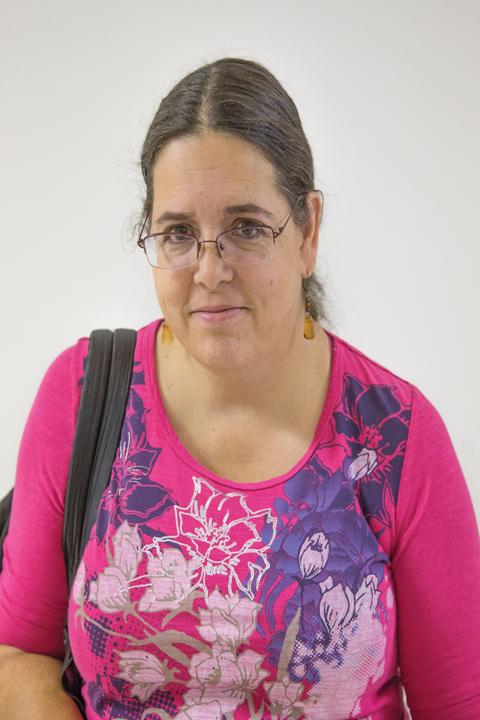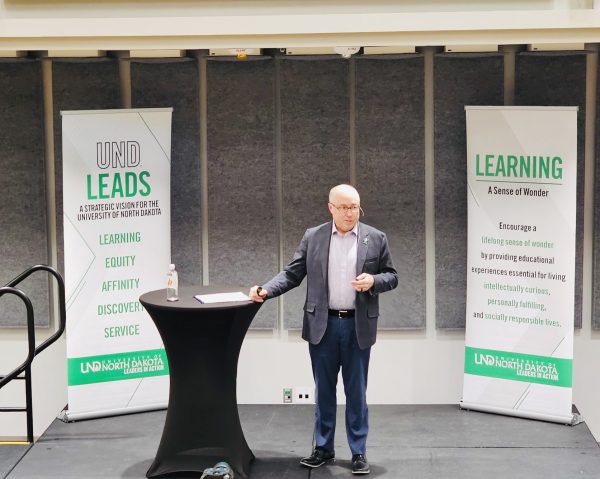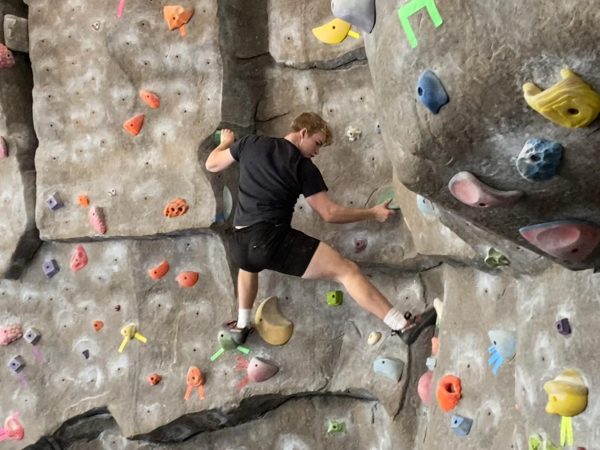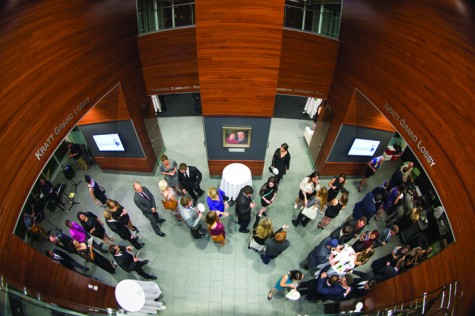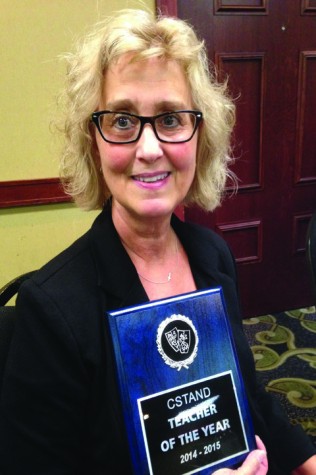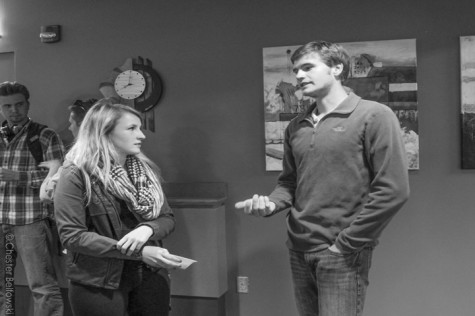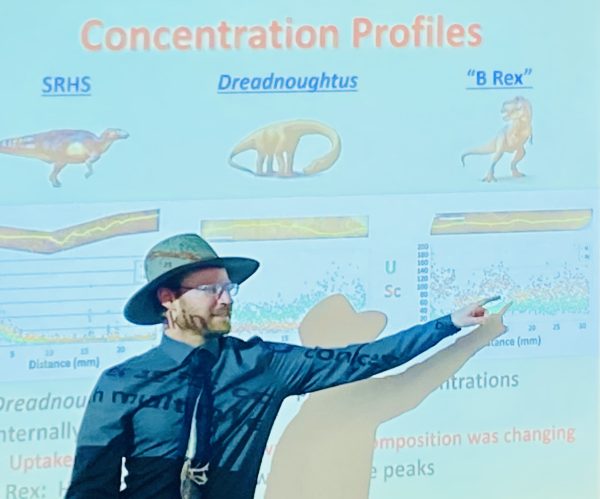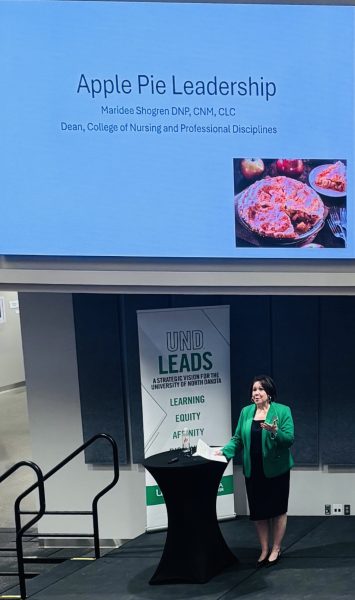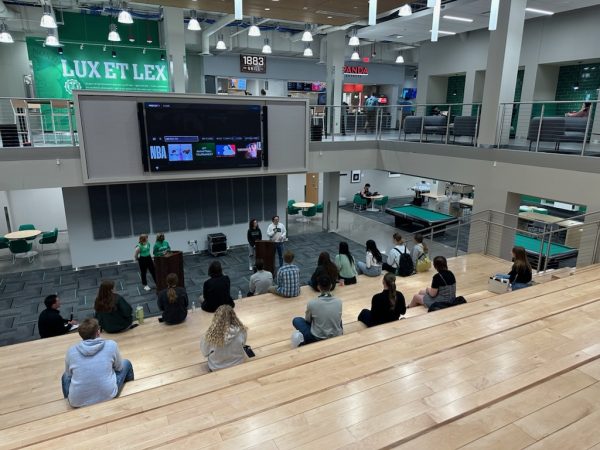In the spotlight: Criminal justice
Wendelin Hume. Photo by Chester Beltowski/TheDakota Student.
Hume lends helping hand in academics, community
By Ashley Carlson
The Dakota Student
Wendelin Hume, a UND professor in the criminal justice department, is a true example of someone who practices what they preach.
Hume sees the criminal justice department as an area for students to go into if they have the desire to help people. She not only teaches the students that have this will, but she also has a strong passion for helping students and the community.
Hume grew up in Ontario on the Ojibwe reservation; she later got her bachelor’s degree at Black Hills State University. As an undergraduate, she had a wide variety of interests.
“I couldn’t decide,” Hume said. “I loved everything. So I did sociology for my major, psychology was my area of emphasis and then computer programming was my minor. But I was most interested in where the disciplines overlapped when dealing with crime and victim issues.”
These interests led Hume to get her master’s and Ph.D. at Sam Houston State University in criminal justice and criminology. Because of her interest in diversity and victim issues that impact both genders, especially women, she developed an interest in women studies as well.
At UND, Hume loves to teach the broad introduction classes, teaching criminal justice and the victimology course. She also coordinates the internship and the cooperative education programs. At the graduate level she does research on statistics.
Hume recently was working with the McNair scholars on research on high school dropout rates for Native American youth, while also looking at some of the issues that relate to opportunities for tribal youth.
Hume’s research mainly is on areas that have real world implications.
“I was one of the ones that helped with looking at gender equity across the North Dakota core systems, which was ordered by the Supreme Court,” Hume said.
“We actually had an addition of the law review, years ago, dedicated to the findings of our study and over time there was an implementation committee that moved on our recommendations to see that there were changes in the laws and policies that are hopefully going to create a more fair environment in the courtroom for the citizens of the state.”
Hume also worked on the Bush longitudinal study on campus that followed freshmen all the way through their senior year.
They would then interview them once or twice a semester to see how they learned, what courses worked for them, and how the university can help them learn better and have a better experience at UND.
“I really loved that because it gets you in touch with the students in their words, so you know what you should be doing differently,” Hume said. “I like research like that because then it informs your teaching of what’s useful.”
When Hume is not teaching or doing research, she is involved with many things outside of school. She does Girl Scouts and volunteer activities, helping the youth in the community.
“Seeing the world through young girl’s eyes just keeps it all kind of fresh and new,” Hume said.
“One of the things about Girl Scouts is that it teaches leadership skills and builds confidence. It exposes girls to all of the things can be and especially in the field of criminal justice, its not what little girls think of when they’re growing up, but I think more and more we need to allow young women to believe they can do anything they want to do.”
Along with organizations outside of school, Hume also is the co-advisor for Alpha Pi Sigma, a national honor society for criminal justice students, and one of the first ones started in the state.
“It’s another way outside of class where you can interact with students,” Hume said. “You get to see them in a different setting and get to know them and give advice.”
Hume has been teaching at UND for 23 years, and her most important reason for staying is because of the students.
“The students here, it’s like they really want to learn, they’re taking this seriously, and they’re looking forward to their future,” Hume said. “I mean when you see the lights go and you see people use what they are trying to learn, that’s what teaching is all about, it’s amazing. So the people, the program, why would you want to leave?”
You can reach Ashley Carlson at [email protected].
Justice system veteran Herbeck brings experience to classes
By Hailie Pelka
The Dakota Student
Long time North Dakotan Dennis Herbeck is a sociology professor who has been teaching criminology at UND for 14 years, 27 straight semesters.
“I have a bachelor’s degree in social work from UND and a master’s degree in
administration from Central Michigan,” Herbeck said. “I got into the business of the courts and probation because of a juvenile probation officer position opened up and I jumped on it. I had some opportunities that came to me early and I stayed.
During his 35 years in the juvenile justice system he worked as a probation officer and a director of juvenile court services.
“Some of my duties were very similar to what a judge would do at that time,” Herbeck said. “I did casework and managed 13 counties in North Dakota as a juvenile director. The last five years, I was a court administrator. I’ve had a good overview ofthe system.”
Having so many years under his belt working in the justice system, he jumped on the opportunity to come back to his
alma mater and teach criminology in the sociology department.
Herbeck was able to bring his first hand account stories to the classroom so students could understand what criminology is all about.
“Of the 14 years I taught here, 12 of those I was still working in the juvenile justice system, so I got to bring a lot of knowledge from there to here,” Herbeck said. “It was really nice and important to be able to apply those theories we talked about in class to what was happening in the real world. You need to be able to apply it.”
Even though Herbeck is now retired from the juvenile justice system, he still uses his experience to help guide him through his teachings.
“We’re quick to label and identify,” Herbeck said. “People in medicine are care ful not to do any harm to their patients, I think in the juvenile justice system and my work there, we needed to be careful not to do any harm their as well. It’s a little bit of a tricky road. The juvenile courts try to rehabilitate and do what was helpful for the families and kids.”
In the classroom and while working in the juvenile justice system, Herbeck was able to touch and help many lives. He wants to help people grow and become a better version of themselves.
“‘What does this class do for me?’ is a fair question students should ask,” Herbeck said. “And sometimes it is our obligation as teachers to figure out and identify what (this class) means to you. I like to tell my students, ‘As a tax payer it is easier to have a point of view when you’re educated and take a good look at it.’ So we really implore students to take a look at things.”
You can reach Hailie Pelka at [email protected].


